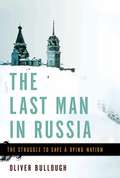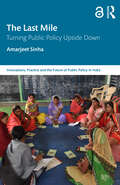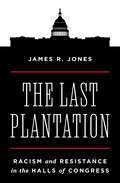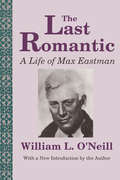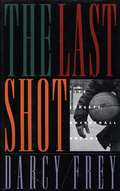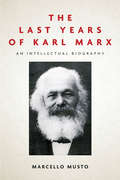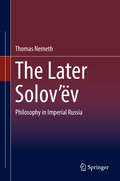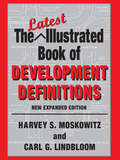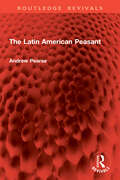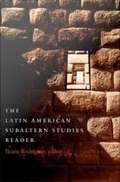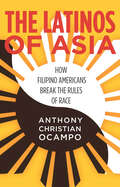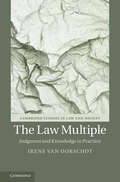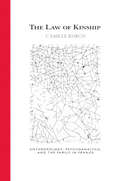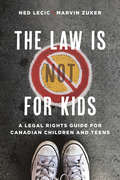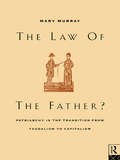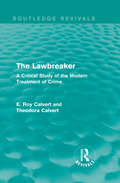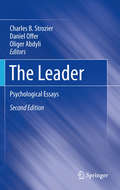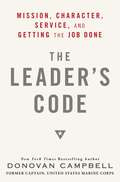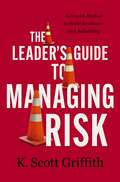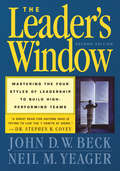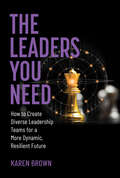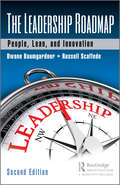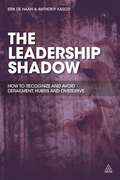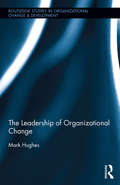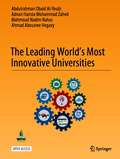- Table View
- List View
The Last Man in Russia: The Struggle to Save a Dying Nation
by Oliver BulloughRussia is dying from within. Oligarchs and oil barons may still dominate international news coverage, but their prosperity masks a deep-rooted demographic tragedy. Faced with staggering population decline--and near-certain economic collapse--driven by toxic levels of alcohol abuse, Russia is also battling a deeper sickness: a spiritual one, born out of the country’s long totalitarian experiment. In The Last Man in Russia, award-winning journalist Oliver Bullough uses the tale of a lone priest to give life to this national crisis. Father Dmitry Dudko, a dissident Orthodox Christian, was thrown into a Stalinist labor camp for writing poetry. Undaunted, on his release in the mid-1950s he began to preach to congregations across Russia with little concern for his own safety. At a time when the Soviet government denied its subjects the prospect of advancement, and turned friend against friend and brother against brother, Dudko urged his followers to cling to hope. He maintained a circle of sacred trust at the heart of one of history’s most deceitful systems. But as Bullough reveals, this courageous group of believers was eventually shattered by a terrible act of betrayal--one that exposes the full extent of the Communist tragedy. Still, Dudko’s dream endures. Although most Russians have forgotten the man himself, the embers of hope that survived the darkness are once more beginning to burn. Leading readers from a churchyard in Moscow to the snow-blanketed ghost towns of rural Russia, and from the forgotten graves of Stalin’s victims to a rock festival in an old gulag camp, The Last Man in Russia is at once a travelogue, a sociological study, a biography, and a cri de coeur for a dying nation--one that, Bullough shows, might yet be saved.
The Last Mile: Turning Public Policy Upside Down (Innovations, Practice and the Future of Public Policy in India)
by Amarjeet SinhaThe Last Mile explores the gaps and dichotomy between drafted policies and their implementation, and the last mile challenges which often make public services inaccessible to the poorest and most vulnerable sections of society. It provides an in-depth overview of the dynamics between communities, research and consultation and the implementation of policies for development. Rich in empirical data and case studies from different government programmes and reports, this book examines the implementation of government service programmes for poverty reduction, women’s empowerment, and income generation for the poor, among others, from a people’s perspective. It highlights the need for policies and institutions to align their methods to community needs. Offering guidelines for redesigning as well as solutions to counter challenges related to lack of trust and effective communication, human resource management, capacity development, redressal mechanisms, and facilitating the last mile connection, the author delineates effective ways for integrating new technologies in policy implementation. The book also addresses legacy issues in institutions and re-orienting policy for better governance, transparency, and building trust. Part of the Innovations, Practice and the Future of Public Policy in India series, this book, by a senior practitioner, will be an essential resource for students and researchers of development studies, sociology, public policy and governance, economics, and South Asian studies. This book is freely available as a downloadable Open Access PDF at http://www.taylorfrancis.com under a Creative Commons (CC-BY-NC-ND) 4.0 license.
The Last Plantation: Racism and Resistance in the Halls of Congress
by James R. JonesA revealing look at the covert and institutionalized racism lurking in the congressional workplaceRacism continues to infuse Congress&’s daily practice of lawmaking and shape who obtains congressional employment. In this timely and provocative book, James Jones reveals how and why many who work in Congress call it the &“Last Plantation.&” He shows that even as the civil rights movement gained momentum in the 1960s and antidiscrimination laws were implemented across the nation, Congress remained exempt from federal workplace protections for decades. These exemptions institutionalized inequality in the congressional workplace well into the twenty-first century.Combining groundbreaking research and compelling firsthand accounts from scores of congressional staffers, Jones uncovers the hidden dynamics of power, privilege, and resistance in Congress. He reveals how failures of racial representation among congressional staffers reverberate throughout the American political system and demonstrates how the absence of diverse perspectives hampers the creation of just legislation. Centering the experiences of Black workers within this complex landscape, he provides valuable insights into the problems they face, the barriers that hinder their progress, and the ways they contest entrenched inequality.A must-read for anyone concerned about social justice and the future of our democracy, The Last Plantation exposes the mechanisms that perpetuate racial inequality in the halls of Congress and challenges us to confront and transform this unequal workplace that shapes our politics and society.
The Last Romantic: Life of Max Eastman
by William L. O'NeillPoet and Journalist Max Eastman is perhaps the most famous example of an American intellectual who during his life moved across the entire political spectrum. This re-examination of his career and his place in history reveals the dynamics behind his several careers and political transformations, offering new insight into one of the most influential writers of the twentieth century.
The Last Shot: City Streets, Basketball Dreams
by Darcy FreyA chronicle of four aspiring young men as they navigate the NCAA recruitment process, their only hope of escape from a life of crime, poverty, and despair.It ought to be just a game, but basketball on the playgrounds of Coney Island is much more than that. In The Last Shot, the aspirations of a few of the neighborhood’s most promising players reveal that what they have going for them (athletic talent, grace, and years of dedication) may not be enough to defeat what’s working against them: woefully inadequate schooling, family circumstances that are often desperate, and the slick, brutal world of college athletic recruitment.Incisively and compassionately written, The Last Shot introduces us to unforgettable characters and takes us into their world with an intimacy seldom seen in contemporary journalism. The result is a startling and poignant exposé of inner-city life and the big business of college basketball.
The Last Years of Karl Marx: An Intellectual Biography
by Marcello MustoAn innovative reassessment of the last writings and final years of Karl Marx. In the last years of his life, Karl Marx expanded his research in new directions—studying recent anthropological discoveries, analyzing communal forms of ownership in precapitalist societies, supporting the populist movement in Russia, and expressing critiques of colonial oppression in India, Ireland, Algeria, and Egypt. Between 1881 and 1883, he also traveled beyond Europe for the first and only time. Focusing on these last years of Marx's life, this book dispels two key misrepresentations of his work: that Marx ceased to write late in life, and that he was a Eurocentric and economic thinker fixated on class conflict alone. With The Last Years of Karl Marx, Marcello Musto claims a renewed relevance for the late work of Marx, highlighting unpublished or previously neglected writings, many of which remain unavailable in English. Readers are invited to reconsider Marx's critique of European colonialism, his ideas on non-Western societies, and his theories on the possibility of revolution in noncapitalist countries. From Marx's late manuscripts, notebooks, and letters emerge an author markedly different from the one represented by many of his contemporary critics and followers alike. As Marx currently experiences a significant rediscovery, this volume fills a gap in the popularly accepted biography and suggests an innovative reassessment of some of his key concepts.
The Later Solov’ëv: Philosophy in Imperial Russia
by Thomas NemethThis volume offers a critical examination of the later philosophical views of Vladimir Solov’ëv, arguably Russia’s most famous and most systematic philosopher. It offers a philosophically informed approach to this pivotal figure and to his era. Inside, readers will discover a detailed portrait of the often overlooked evolution of the philosopher’s views during the final two decades of his life. The author explores Solov’ëv’s still evolving aesthetic philosophy and his entry into the lively Russian discussion of free will. The work then turns to the philosopher’s mature statements on many figures from within the history of philosophy. This includes Kant and Hegel. Next, readers will learn about his disagreements with several contemporaries as well as contemporaneous movements. These include positivism and materialism. In addition, the coverage includes an elucidation and examination of Solov’ëv’s final expression of his ethical philosophy as set forth in his major ethical treatise Justification of the Moral Good.The overall picture that emerges is of a much more vibrant and heated philosophical community than typically portrayed in Western secondary literature. The book ends with a reflection on the rise of Solov’ëv as a religious mystic at the expense of a critical evaluation of his thought.
The Latest Illustrated Book of Development Definitions
by Carl G. LindbloomIllustrated definitions are rarely found in zoning and development ordinances. Ordinances prefer the "thousand words" rather than the "single picture." Illustrations greatly simplify how standards should be applied, particularly where the lot or parcel is irregularly shaped or where there are a number of variables present, each of which might have an impact on how the ordinance might apply in a specific situation. This best-selling resource has been the mainstay of the planner's bookshelf since its first publication and it differs from other books and publications containing development definitions in three major respects: It is illustrated; most of the definitions are designed to be used directly in ordinances with little or no change; and the more complex definitions are accompanied by commentaries and annotations that explain how the definition may be used in an ordinance, along with background information pertinent to the definition. This expanded edition standardizes in one handy reference all the key terms used in zoning, subdivision, site plan, and environmental ordinances. In all, it contains 1,957 definitions and 103 illustrations that can be incorporated in local ordinances with little or no change. Written and illustrated by two professional planners with nearly eighty years of combined experience in the practice of planning and zoning, this is a basic working tool and required reference for anyone involved in land development planning and regulation.
The Latin American Peasant (Routledge Revivals)
by Andrew PearseFirst Published 1975, The Latin American Peasant is not a historian’s book, the presentation is rather sociological in that it seeks to explain the working out of a process of social transformation and the social forces which are released by the pursuit of common interests by social entities such as classes and territorial groups, and the pursuit of a vision of livelihood by individuals and families.The peasant, in the sense of this book, is the agricultural producer and cottage craftsman of pre industrial and partially industrial societies, who produces for the provisioning of his own household, and for market exchange, and lives in land groups. The concept peasant, taken as equivalent of the word campesino or campones, does have both historical and geographical reality in the Latin American context. The book discusses important themes such as land labor institutions in Latin America; peasant action; the transformation of the estate; peasants and revolution in Bolivia; and peasant organization and peasant destinies. This this is an important book for scholars and researchers of Latin American sociology, rural sociology, historical sociology and sociology in general.
The Latin American Subaltern Studies Reader
by Ileana RodríguezSharing a postrevolutionary sympathy with the struggles of the poor, the contributors to this first comprehensive collection of writing on subalternity in Latin America work to actively link politics, culture, and literature. Emerging from a decade of work and debates generated by a collective known as the Latin American Studies Group, the volume privileges the category of the subaltern over that of class, as contributors focus on the possibilities of investigating history from below. In addition to an overview by Ranajit Guha, essay topics include nineteenth-century hygiene in Latin American countries, Rigoberta Mench after the Nobel, commentaries on Haitian and Argentinian issues, the relationship between gender and race in Bolivia, and ungovernability and tragedy in Peru. Providing a radical critique of elite culture and of liberal, bourgeois, and modern epistemologies and projects, the essays included here prove that Latin American Subaltern Studies is much more than the mere translation of subaltern studies from South Asia to Latin America. Contributors. Marcelo Bergman, John Beverley, Robert Carr, Sara Castro-Klarn, Michael Clark, Beatriz Gonzlez Stephan, Ranajit Guha, Mara Milagros Lpez , Walter Mignolo, Alberto Moreiras, Abdul-Karim Mustapha, Jos Rabasa, Ileana Rodrguez, Josefina Saldaa-Portillo, Javier Sanjins, C. Patricia Seed, Doris Sommer, Marcia Stephenson, Mnica Szurmuk, Gareth Williams, Marc Zimmerman
The Latinos of Asia
by Anthony OcampoIs race only about the color of your skin? In The Latinos of Asia, Anthony Christian Ocampo shows that what "color" you are depends largely on your social context. Filipino Americans, for example, helped establish the Asian American movement and are classified by the U.S. Census as Asian. But the legacy of Spanish colonialism in the Philippines means that they share many cultural characteristics with Latinos, such as last names, religion, and language. Thus, Filipinos' "color"--their sense of connection with other racial groups--changes depending on their social context. The Filipino story demonstrates how immigration is changing the way people negotiate race, particularly in cities like Los Angeles where Latinos and Asians now constitute a collective majority. Amplifying their voices, Ocampo illustrates how second-generation Filipino Americans' racial identities change depending on the communities they grow up in, the schools they attend, and the people they befriend. Ultimately, The Latinos of Asia offers a window into both the racial consciousness of everyday people and the changing racial landscape of American society.
The Law Multiple: Judgment and Knowledge in Practice (Cambridge Studies in Law and Society)
by Irene van OorschotIn the field of socio-legal studies or law and society scholarship, it is rare to find empirically rich and conceptually sophisticated understandings of actual legal practice. This book, in contrast, connects the conceptual and the empirical, the abstract and the concrete, and in doing so shows the law to be an irreducibly social, material and temporal practice. Drawing on cutting-edge work in the social study of knowledge, it grapples with conceptual and methodological questions central to the field: how and where judgment empirically takes place; how and where facts are made; and how researchers might study these local and concrete ways of judging and knowing. Drawing on an ethnographic study of how narratives and documents, particularly case files, operate within legal practices, this book's unique and innovative approach consists of rearticulating the traditional boundaries separating judgment from knowledge, urging us to rethink the way truths are made within law.
The Law Of Kinship
by Camille RobcisIn France as elsewhere in recent years, legislative debates over single-parent households, same-sex unions, new reproductive technologies, transsexuality, and other challenges to long-held assumptions about the structure of family and kinship relations have been deeply divisive. What strikes many as uniquely French, however, is the extent to which many of these discussions-whether in legislative chambers, courtrooms, or the mass media-have been conducted in the frequently abstract vocabularies of anthropology and psychoanalysis. In this highly original book, Camille Robcis seeks to explain why and how academic discourses on kinship have intersected and overlapped with political debates on the family-and on the nature of French republicanism itself. She focuses on the theories of Claude Levi-Strauss and Jacques Lacan, both of whom highlighted the interdependence of the sexual and the social by positing a direct correlation between kinship and socialization. Robcis traces how their ideas gained recognition not only from French social scientists but also from legislators and politicians who relied on some of the most obscure and difficult concepts of structuralism to enact a series of laws concerning the family. Levi-Strauss and Lacan constructed the heterosexual family as a universal trope for social and psychic integration, and this understanding of the family at the root of intersubjectivity coincided with the role that the family has played in modern French law and public policy. The Law of Kinship contributes to larger conversations about the particularities of French political culture, the nature of sexual difference, and the problem of reading and interpretation in intellectual history.
The Law is (Not) for Kids: A Legal Rights Guide for Canadian Children and Teens
by Ned Lecic Marvin A. ZukerIn this practical guide to the law for young people of Canada, Ned Lecic and Marvin Zuker provide an all-encompassing manual meant to empower and educate children and youth and those that serve them. The authors address questions about how rights and laws affect the lives of young people at home, at school, at work, and in their relationships as they draw attention to the many ways in which a person’s life can intersect with the law. Deliberately refraining from taking a moral approach, the authors instead advocate for the rights of children and provide examples of how young people can get their legal rights enforced. In addition to being critical information for youth about citizenship, The Law is (Not) for Kids is a valuable resource for teachers, counsellors, lawyers, and all those who support youth in their encounters with the law.
The Law of the Father?: Patriarchy in the transition from feudalism to capitalism
by Mary MurrayA coherent and focussed exploration into how Patriarchy constructed pre-capitalist and capitalist society, and its role in the transition from feudalism to capitalism.
The Lawbreaker: A Critical Study of the Modern Treatment of Crime (Routledge Revivals)
by E. Roy Calvert Theodora CalvertThe early 21st century saw better prison conditions and a lower imprisonment rate however public worry over supposed increasing violent crime as perpetuated by the media in the 1930’s led to a return to harsher sentences and fuller prisons. Originally published in 1933, The Lawbreaker analyses British penal methods of the time and of the past to discover the most effective ways to treat prisoners and reduce crime as well as identifying where more research is needed to obtain a balance between punishment and rehabilitation. This title will be of interest to students of Criminology and Sociology.
The Leader
by Charles B. Strozier Daniel Offer Oliger AbdyliThis volume examines the lives of prominent leaders from ancient Greece to the present. It explores how these leaders imposed their individual missions and mystiques on others, thereby fulfilling , and sometimes creating, distinct needs in their followers.
The Leader's Code: Mission, Character, Service, and Getting the Job Done
by Donovan CampbellWhat does it take to be a great leader? In a word: character. This unique book by decorated U.S. Marine Corps veteran Donovan Campbell, the New York Times bestselling author of Joker One, draws on his years of training and combat experience to reveal the specific virtues that underpin effective leadership--and how anyone can stand up, serve others, and make a difference in the world by bringing out the best in a team. The Leader's Code is a practical action plan that can be applied to any situation in which exemplary leadership is required, whether that be at home or in the workplace. Moreover, The Leader's Code unpacks the military servant-leader model--a leader must take care of his mission first, his team second, and himself a distant third--and explains why this concept of self-sacrifice is so needed in today's world. Focusing on the development of character as the foundation of servant-leadership, Campbell identifies character's six key attributes: humility, excellence, kindness, discipline, courage, and wisdom. Then, drawing on lessons from his time in the Corps and stories from history, Scripture, and American business, he shows us how to develop those virtues in order to take the helm with confidence, conviction, and a passion to bring out the best in others. Being a leader is about being worthy of being followed. True leaders, Campbell argues, foster compassion for others and they pursue excellence in all that they do. They are humble and know how to self-correct. Campbell's exploration of these vital qualities is wide-ranging, as he takes us from the boardrooms of the world's most successful companies to the Infantry Officer Course, the intense twelve-week training gauntlet that Marines use to prepare their leaders to sacrifice themselves for the welfare of others. With faith in our political and business leaders at an all-time low, America is in the midst of a crisis of trust. Yet public opinion polls show that there is one institution that still commands widespread respect because of its commitment to character and sacrifice: the United States military. The Leader's Code shows that this same servant-leader model can help us all become our best selves--and provide a way forward for our nation.Advance praise for The Leader's Code "A refreshing model for leadership, offering convincing principles and motivating examples that are sure to make a difference in a leader's personal and professional life. I can't remember a leadership book that has had more influence on my thinking."--Steve Reinemund, dean of business, Wake Forest University, and retired chairman and CEO, PepsiCo "Donovan Campbell has written a superb, thoughtful, all-encompassing examination of leadership and leaders. His key lessons, easily understood and well articulated, are applicable at home, within the community, and to professionals in all walks of life. The Leader's Code is an important book for anyone concerned about today's leadership crisis in our country and in our communities."--General Mike Hagee, USMC (Ret.), 33rd Commandant of the U.S. Marine Corps "Donovan Campbell nails it as he speaks to our country's need for leadership at every level: at home, in the marketplace, in education, in government, and in the military. The Leader's Code is a clear call to be focused on the right mission, in the right way, and at the right time. This is a thoughtful book that will keep you awake at night and challenge you to dream in the daytime!"--Dennis Rainey, president and CEO, FamilyLifeFrom the Hardcover edition.
The Leader's Guide to Managing Risk: A Proven Method to Build Resilience and Reliability
by K. Scott GriffithBe prepared for the dangerous and largely unknown risks that threaten your business and learn how to survive and thrive when uncertainty hits.Leaders today must navigate their teams and organizations through unprecedented levels of uncertainty. It feels like every year there is some-game changing technology or catastrophe that gives rise to a &“new normal&” and sends businesses scrambling for how to rethink themselves to operate under these new conditions. In The Leader&’s Guide to Managing Risk, K. Scott Griffith, a former airline pilot, socio-technical physicist, and author of the first independently-audited high reliability and just culture model offers practical and proven methods to build processes that will withstand the winds of uncertainty while driving success. By understanding that organizations are people operating within systems, leaders of all kinds will build reliability and resiliency into their culture and set up their business to withstand the next big changes that come their way. Learn a new way of seeing, understanding, and managing risk.Understand how people and systems interact in organizations and how to build processes that increase resilience and performance.Collaborate with all stakeholders, including employees, to help you foresee dangers and achieve sustainable reliability.Implement proven methods from Scott&’s award-winning model that is being used in some of the most prestigious healthcare, EMS, and transportation companies in the world.Achieve independent validation of success through certification.
The Leader's Window: Mastering the Four Styles of Leadership to Build High-Performing Teams
by John D.W. Beck Neil YeagerThe Leader's Window presents an authoritative leadership system to help you give your employees what they need, when they need it, in a form in which they can use it. New and updated leader profiles and case examples illustrate the variety of successful strategies high-profile leaders use, while stories of misguided leadership show pitfalls to avoid. With new information on managing Generation X and adapting to diverse personality types, this classic resource presents the strategies you need to make the most of individual capabilities and simultaneously achieve goals. Charts, action lists, cases for reflection, process plans, performance contracts, self-assessments and tools to crease baseline leadership measures provide the help you need to harness the potential of each worker and transform that potential into results-driven teams.
The Leaders You Need: How to Create Diverse Leadership Teams for a More Dynamic, Resilient Future
by Karen BrownAn innovative, field-tested framework for leaders and managers on how to create more diverse leadership and management teams.We need the strength that comes from diversity more now than we ever have in our collective memory. Without leadership teams that reflect the full range of humanity, for-profit and nonprofit organizations alike will find it more difficult to confront today’s challenges and are unlikely to thrive in the long term. But no two organizations have the same need for greater diversity in leadership nor the same path to achieving it. In The Leaders You Need, Karen Brown offers an innovative, field-tested ABCD Framework that will help readers to discover the hidden leadership and management talent in their organizations—and how to harness it. Karen Brown shares the approach she has used to guide organizations from small nonprofits to the Global 500 on their journey to greater diversity in leadership and management. Her framework consists of four pillars:• How to align diversity, equity, and inclusion efforts with business priorities• How to build strong partnerships with stakeholders• How to cultivate a culture of role models• How to define objectives and outcomes with dataReaders will learn how to use the framework to identify and dismantle the barriers to greater leadership and management diversity in their organizations. What’s more, they will get practical advice on how to become inclusive leaders who create opportunities for everyone on their teams to learn, grow, and fulfill their potential.
The Leadership Roadmap: People, Lean, and Innovation, Second Edition
by Dwane Baumgardner Russell ScaffedeFor more than 60 years, a few organizations have followed what is known as the "Scanlon Plan" for employee engagement. Some early benefits were achieved and employee satisfaction was high in these companies, such as Donnelly Corporation and Herman Miller Office Furniture. Likewise, for more than 30 years now, US and European companies have been studying and adapting the Toyota Production System (TPS), which has been dubbed as "Lean." Again, some long-term benefits have been achieved, but many have not transformed their workplace culture or achieved operational excellence. The Leadership Roadmap combines the two philosophies of both employee engagement and Lean into one concise and understandable system for leaders to follow. If leaders truly want success like Toyota, they must understand it is the combination of TPS with total employee engagement that made this company a sustaining industry leader. By following the outlined system, leaders will not only make a more successful organization for all stakeholders but will truly enhance their employee satisfaction with their daily work. This book is not just for CEOs, CFOs, and others at the executive level – it is for employees in human resources or project development, the plant manager or first line supervisor. Essentially, it is for anyone in the organization who shares a strong commitment to the foundational premise of integrating the leadership of people, Lean transformation, and innovation systems. The Leadership Roadmap is a practical resource that will foster a new generation of roving leaders -- committed team members who are willing to step up and fill a void and who lead by asking questions that trigger positive change rather than simply giving orders. These new leaders will understand that while the framework for achieving success is simple, the implementation can be complex and daunting, requiring a firm and enduring dedication to renewal, and a step-by-step guide to show them the way.
The Leadership Shadow
by Erik De Haan Anthony KasoziIn today's fast paced, interconnected, and mercilessly competitive business world, senior executives have to push themselves and others hard. Paradoxically, to succeed as leaders, they also need to relate to others very well. Under stress and challenge, the qualities executives have relied on to get them to the top and to achieve outstanding results can overshoot into unhelpful drives that lead to business and personal catastrophes.The Leadership Shadow draws on the lived experience of executives to make sense of what actually happens when their drivers overshoot and they act out the dark side of leadership. It shows how executives can find stability in the face of uncertainty, resilience in the face of gruelling demand, and psychological equilibrium as a leader in the face of turbulence.
The Leadership of Organizational Change (Routledge Studies in Organizational Change & Development)
by Mark HughesUnderstanding both leadership and change have been recurrent and popular themes within the business, management and organization studies literature. However, our understanding of leadership and organizational change in combination is far more limited. The Leadership of Organizational Change offers a critical review of the evolution of leadership and organizational change for the past thirty-five years, taking stock of what we know, identifying what we do not know, and establishing how the study of the leadership of change should advance. In the late seventies and early eighties, as interest in managing and leading change was fuelled by the competitive threat of Asia in general and Japan in particular as perceived by western businesses and governments, Burns (1978) writing in his landmark book Leadership at this time, referred to an intellectual crisis: "The crisis of leadership today is the mediocrity or irresponsibility of so many of the men and women in power, but leadership rarely rises to the full need for it. The fundamental crisis underlying mediocrity is intellectual. If we know all too much about our leaders, we know far too little about leadership." While the study of managing change has benefitted from sustained critical scrutiny, particularly in the last decade, it is believed that this is to have been at the expense of critical scrutiny of leading change. The Leadership of Organizational Change critically reviews how the study of leading change has advanced since 1978 and the crisis of intellectual mediocrity.
The Leading World’s Most Innovative Universities
by Abdulrahman Obaid AI-Youbi Adnan Hamza Zahed Mahmoud Nadim Nahas Ahmad Abousree HegazyThis open access book is unique in its contents. No other title in the book market has tackled this important subject. It introduces innovation as a way of practice for world-class universities. It, then, discusses the criteria for being innovative in the academic world. The book selects some of the top innovative world-class universities to study the factors that qualified them to be innovative, so that any other university can follow their steps to become innovative. The final chapter of the book presents some recommendations in this regard.
